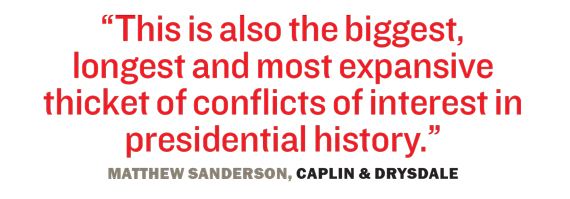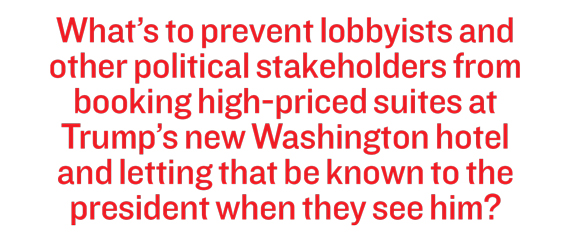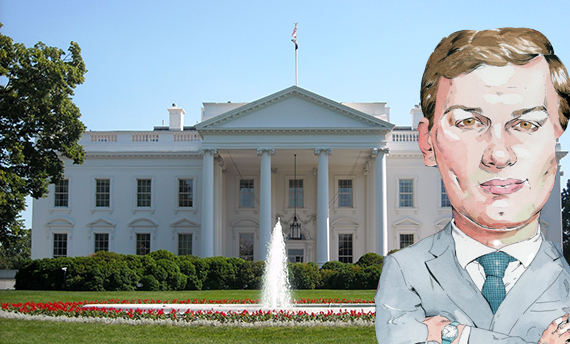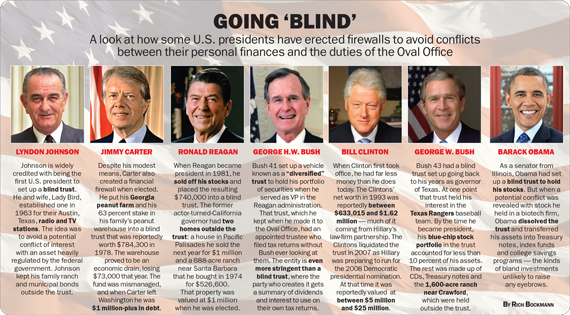Two weeks before his upset White House victory, Donald Trump [TRDataCustom] broke out the golden scissors for a ribbon-cutting ceremony at the Old Post Office building in Washington, D.C., which his real estate company had converted into a 263-room luxury Trump International Hotel.
“This will be one of the great hotels anywhere in the world,” he said inside the building while union protesters marched outside.
“I want to particularly congratulate Ivanka, because Ivanka, this was her baby,” he continued, referring to his daughter. “She worked so closely with the [General Services Administration] — great, great professionals.”
Indeed, the GSA, which administers more than $65 billion a year in federal government contracts, negotiated the Trump Organization’s 60-year, $180 million lease on the landmark building, which sits a few blocks down Pennsylvania Avenue from the White House.
Now, with his election, Trump is on the brink of nominating a new GSA chief and will essentially become his own hotel landlord.
While that situation may seem extreme, it’s just one example of the perfect storm of potential conflicts looming over the president-elect’s head that could call into question whether he will be able to separate his personal interests from those of the American people.
Indeed, when Trump gets sworn in as the country’s 45th president next month he will bring with him a web of conflicts on a scale that has never before been seen at the White House.
Much ink was spilled over these conflicts during the campaign — and since he was elected, news of additional business entanglements has been breaking on a near-daily basis. But since Trump has broken with decades of tradition and refused to release his tax returns, the full scope of his business interests still remains unknown.
One financial disclosure that Trump filed in July 2015 listed more than 500 of his companies, many of which do business with foreign governments and interact with the federal government.
As The Real Deal and others have reported, U.S. presidents are not required to cut ties to their outside businesses. In fact, legislation enacted in the wake of the Watergate scandal in the 1970s explicitly allows presidents to collect outside income.
Yet the political pressure to unravel these conflicts has ramped up since Trump’s stunning victory.
Massachusetts Rep. Katherine Clark, a Democrat, introduced legislation last month that would close the exemption allowing presidents and vice presidents to engage in government business they could profit from. (Other federal elected officials are barred by law from doing so.)
“Every recent president in modern history has taken steps to ensure his financial interests do not conflict with the needs of the American people,” Clark said in a news release.
 “The American people need to be able to trust that the president’s decisions are based on the best interests of families at home, and not the president’s financial interests,” she added.
“The American people need to be able to trust that the president’s decisions are based on the best interests of families at home, and not the president’s financial interests,” she added.
Trump doesn’t seem all that concerned. “In theory I could run my business perfectly and then run the country perfectly,” he said during a meeting late last month with the New York Times. “There’s never been a case like this.”
On that point, Trump is, in fact, correct.
The U.S. has never elected a president as wealthy or with as many far-reaching financial ties as Trump — a fact he alluded to when he noted that the disclosure forms he filed during the campaign were not designed for candidates with vast wealth.
“As they said at the time, this is the biggest, longest, most expansive personal financial disclosure form in presidential history,” said Matthew Sanderson, a Republican attorney in the political law group at the Washington, D.C., firm Caplin & Drysdale.
“They said it in kind of a bragging way,” he added, “but this is also the biggest, longest and most expansive thicket of conflicts of interest in presidential history.”
Foreign friends
For years the Trump Organization has expanded its presence around the globe, opening hotels and golf courses in a slew of foreign countries — from Panama to Scotland to the United Arab Emirates.
Those Trump projects, however, have now taken on a new significance, as have Trump’s relationships with foreign governments.
The concern, of course, is that his ties could impact how he pursues U.S. foreign policy and that he could be vulnerable to influence by foreign leaders.
Of particular concern, experts say, is his connection to Russia — which has had an increasingly strained relationship with the U.S. in recent years.
The U.S. intelligence community believes that Russian officials hacked (and then leaked) Hillary Clinton’s emails to interfere with the election.
Despite that tense relationship, Trump showered the dictator-like Russian President Vladimir Putin with praise on the campaign trail.
The Trump Organization has been attempting to break into the Russian market for years. In 2005, Trump signed a one-year agreement with the Bayrock Group — managed by Felix Sater, a Russian immigrant who was convicted in a $40 million Mafia-linked stock fraud scheme in the late 1990s — to explore opportunities in Moscow. The partners found a site, but the deal fizzled.
And in 2013, Trump brought the Miss Universe pageant to Moscow with the help of Russian billionaire Aras Agalarov.
Russian-American real estate attorney Ed Mermelstein said concerns about Trump’s ties to Russia are moot given that the economy there has taken a hit because of low oil prices.
“In the last five years it’s made no sense for any business to happen between [Trump] and anyone there,” he said. “If anything, they would probably be more interested in working with him in the United States.”
Nonetheless, his relationships with Russia and every other country he’s had dealings with are coming under increased scrutiny.
Regulating a president’s connections with foreign governments is the little-known Emoluments Clause, which has been dusted off and repeatedly cited since Trump announced his candidacy. The constitutional provision dates back to 1787 and was meant to bar U.S. government officials and retired military personnel from accepting titles of nobility in foreign countries. In recent years, however, it’s been interpreted far more broadly to ban U.S. officials from accepting any kind of gift from a foreign entity.
That could be a problem for Trump, given several assets in his portfolio.
For example, in 2012 Trump and Vornado Realty Trust secured a $950 million loan at the 2 million-square-foot 1290 Sixth Avenue from a consortium of four banks: the German American Capital Corporation, UBS Real Estate Securities, Goldman Sachs and the Bank of China.
The Bank of China could pose trouble for Trump — who has a 30 percent stake in the property — because it’s owned by the Chinese government.
If, for example, the lender shaved a few basis points off the loan’s interest rate, that could constitute a gift from China, a country that was in Trump’s crosshairs on the campaign trail on issues including free trade and currency manipulation.
Richard Painter — a professor at the University of Minnesota Law School who served as the chief ethics lawyer in President George W. Bush’s administration from 2005 to 2007 — said he thinks the Trump Organization needs to find another lender to replace Bank of China so it’s not negotiating with the Chinese government.
“I personally think you’ve got to refinance that Bank of China loan right away,” he said.
Trump also owns golf courses in Scotland and Ireland and he has land leases with the government of St. Vincent and the Grenadines. In addition, his firm manages Trump-branded properties in Panama, Dubai and Brazil. It also has royalty agreements with projects in Turkey and the Philippines and in many other countries around the globe for the use of the Trump name.
Should any of those governments provide what could be perceived as unusually favorable treatment — such as a property-tax break — he could be in violation of the Emoluments Clause, which is grounds for impeachment, experts say. As legal experts mull the gray areas of the clause, Trump is providing plenty of new fodder. Late last month, the New York Times reported that since his election, Trump has met with a British politician, who he pressed to oppose offshore wind farms that could taint the view from his Scottish golf course, and Indian investors who own Trump Towers Pune in India.
Meanwhile, in the former Soviet republic of Azerbaijan, Trump is working on a hotel project in partnership with the son of a government official who’s been accused of laundering money for the Iranian military.
Painter said the president could run afoul of the Emoluments Clause even if he doesn’t acknowledge or actively accept something perceived as a “gift,” such as a refinancing pursued by an investment partner.
“You don’t have to write a thank-you note to accept a gift,” he said.
Federal affairs
Trump also has a minefield of conflicts to navigate in the U.S.
Not only does his own company have business and legal dealings with the federal government, he also works with companies that do.
For example, Deutsche Bank — the lender on his Doral hotel and golf course in Miami and his Trump International Hotels in Washington, Las Vegas and Hawaii — is negotiating a $14 billion settlement with the Department of Justice over a set of high-profile mortgage-securities probes stemming from the bank’s role in the financial crisis.
Last month, in the midst of that negotiation, Trump nominated Republican Sen. Jeff Sessions of Alabama as attorney general to oversee the DOJ. A friendly stance from Sessions — a controversial figure, who still needs to be confirmed by Congress — would no doubt go a long way for Deutsche Bank.
Scott Amey, general counsel at the watchdog Project On Government Oversight, said Trump’s business interests raise red flags about how his AG might run the DOJ.
 “We’ll have to kind of wait and see — possibly on a case-by-case basis — how the Department of Justice handles prosecutions or civil cases as well as how agencies handle any enforcement actions with companies he’s done business with in the past,” he said.
“We’ll have to kind of wait and see — possibly on a case-by-case basis — how the Department of Justice handles prosecutions or civil cases as well as how agencies handle any enforcement actions with companies he’s done business with in the past,” he said.
“We certainly hope there isn’t any pressure from the top down in a fashion that puts [Trump’s] personal financial interests ahead of those of the country,” Amey added.
And while he doesn’t have oversight over state prosecutors, last month Trump agreed to shell out $25 million to settle two class-action lawsuits and a suit brought by New York AG Eric Schneiderman alleging that Trump defrauded students at his for-profit Trump University.
Meanwhile, at the Trump International Hotel in Las Vegas, Trump is in the midst of a dispute with the Culinary Workers Union after refusing to negotiate with labor leaders when employees voted to unionize last year.
In the week before the election, the National Labor Relations Board ordered Trump to begin bargaining with the union over wages and working conditions for about 500 housekeepers, food and beverage staffers and guest-service workers.
As president, Trump will appoint the five members of the NLRB, where there are currently two vacant seats and three terms expiring by the end of 2019.
Trump has already moved to have the case heard by the U.S Court of Appeals’ D.C. Circuit.
And, just a few days after winning the election, Trump filed a lawsuit against the District of Columbia in D.C.’s Superior Court seeking a reduction of the $91 million tax bill at his new hotel. The court currently has five vacancies, which Trump will nominate judges to fill.
Federal guidelines would actually have prevented the GSA from awarding a sitting president’s company a lease like the one the Trump Organization locked in at the former post office.
But unlike almost every other federal contract, Trump’s lease reportedly prohibits the GSA from unilaterally terminating the deal.
The company conundrum
While blind trusts are not mandated for presidents, there’s a long tradition of commanders in chief who have used them to erect a firewall between their official duties and personal finances.
The custom dates back to at least Lyndon Johnson, who set up a trust to hold his Texas TV station. Jimmy Carter, meanwhile, put his Georgia peanut farm and warehouse in the hands of an independent trustee who could sell the warehouse or rent the farm without the president’s knowledge.
George W. Bush had a blind trust as president, while Barack Obama had a blind trust as a senator but sold off his stocks and invested in bland U.S. Treasury bonds and diversified funds when a conflict involving a biotech firm was revealed.
But Trump’s situation is unique.
While he has said he’ll put his businesses into a blind trust, he’s also said his children will be the ones running those companies — a move experts say does very little to create a firewall.
Kenneth Gross, a partner at Skadden Arps, said Trump’s interests are too intertwined with his children’s.
“His remedy of putting his assets in a blind trust for children to run doesn’t really accomplish anything in terms of ethics or conflicts of interest,” said Gross, who served as associate general counsel of the Federal Election Commission and advised Mayor Michael Bloomberg and others on conflicts of interest.
Already last month, Ivanka Trump caused a stir when she was photographed at a sit-down with her father and Japanese Prime Minister Shinzo Abe, raising questions about the separation of business and family.

Jared Kushner at the White House
And Trump’s blind trust would be further complicated by his relationship with Ivanka’s husband, Jared Kushner, who as of last month was reportedly consulting with a lawyer to see if he could get around anti-nepotism laws to take a position in the White House.
In addition to profiting, experts say, the Trump Organization could serve as a conduit to influence the president.
What’s to prevent lobbyists and other political stakeholders from booking high-priced suites at Trump’s new Washington hotel — or other Trump facilities — and letting that be known to the president when they see him?
“It would be very easy for folks to believe that by doing business with the Trump brand, they’re doing business with the president,” said Lisa Gilbert of the good-government watchdog group Public Citizen.
Trump told the New York Times last month that his brand has gotten “hotter” since he won the election.
Taking stock
Trump’s stock portfolio — which according to 2015 public disclosures is worth somewhere between $33 million and $88 million — is probably the most clear-cut of his assets for detecting conflicts.
As of last year, the portfolio spanned sectors such as technology, finance, energy and defense — all areas the president-elect has positions on.
For example, Trump holds up to $1 million worth of stock in Energy Transfer Partners, the company building the controversial $3.7 billion Dakota Access Pipeline, which is being constructed to carry oil from North Dakota to Illinois.
Obama supports rerouting the pipeline away from the Standing Rock Sioux reservation, the site of clashes between police and opponents of the pipeline. But Trump has pledged to remove all impediments to the project within his first 100 days in office.
The CEO of Energy Transfer Partners, Kelcy Warren, told the Wall Street Journal last month that he’s “pretty confident that worst case, Jan. 20, we get our easement and proceed.”
Trump also owns stock in financial firms like Morgan Stanley, Goldman Sachs and Bank of America. Those firms could all see a profit boon if Trump pushes through a repeal of Dodd-Frank and deregulates the banking industry, as he has promised.
“If I’m his attorney, what I would be doing is looking for low-hanging fruit to sell off,” Caplin & Drysdale’s Sanderson said.
“Some of these assets are relatively liquid and he can exit easily, or they’re going to cause such problems on an ongoing basis that it’s not worth it.”
It’s unclear, though, exactly where Trump’s stock portfolio stands now, because his latest personal finance disclosures were released almost a year and a half ago.
And during an interview on CNBC’s “Squawk Box” this past September, Trump said he’s already sold off holdings.
“I sold them, because when I decided to do this I figured maybe there’s a conflict of interest, who knows?” he said. “You know, with them, they accuse you of anything, so I figured I’d sell.”

